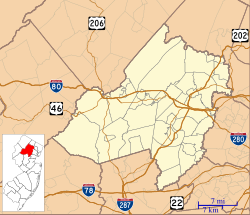Morris Plains | |||||||||||||
|---|---|---|---|---|---|---|---|---|---|---|---|---|---|
 | |||||||||||||
| General information | |||||||||||||
| Location | 673 Speedwell Avenue, Morris Plains, New Jersey | ||||||||||||
| Lines | NJT Bus : 872, 875, 880 | ||||||||||||
| Platforms | 2 side platforms | ||||||||||||
| Tracks | 2 | ||||||||||||
| Other information | |||||||||||||
| Station code | 432 (Delaware, Lackawanna and Western) [1] | ||||||||||||
| Fare zone | 16 | ||||||||||||
| History | |||||||||||||
| Opened | July 4, 1848 [2] [3] | ||||||||||||
| Rebuilt | 1915 [4] | ||||||||||||
| Electrified | January 22, 1931 [5] | ||||||||||||
| Passengers | |||||||||||||
| 2024 | 421 (average weekday) [6] | ||||||||||||
| Services | |||||||||||||
| |||||||||||||
| |||||||||||||
Morris Plains Station | |||||||||||||
| Coordinates | 40°49′43″N74°28′42″W / 40.82861°N 74.47833°W | ||||||||||||
| Area | 1.5 acres (0.6 ha) | ||||||||||||
| Built | 1915 | ||||||||||||
| Architect | Nies, Frank J. | ||||||||||||
| Architectural style | Renaissance | ||||||||||||
| MPS | Operating Passenger Railroad Stations TR | ||||||||||||
| NRHP reference No. | 84002780 [7] | ||||||||||||
| Added to NRHP | June 22, 1984 | ||||||||||||
| |||||||||||||
Morris Plains Station is a NJ Transit station in Morris Plains, in Morris County, New Jersey, United States, along the Morristown Line at Route 202 (Speedwell Avenue/Littleton Road) in downtown Morris Plains.
Contents
The former Lackawanna station was built in 1915 and has a brick station house. It was designed by architect Frank J. Nies who built other stations for the Delaware, Lackawanna and Western Railroad. Unlike most of his stations which tended to resemble massive cathedrals, Morris Plains station was built as a simple one-story structure, which also contains a unique Spanish tile roof. An old train station just to the north now serves as The Morris Plains Model Railroad Club. [8] The station was added to the National Register of Historic Places on June 22, 1984, along with over 100 other stations within the state as part of the Operating Passenger Railroad Stations Thematic Resource. [9]



